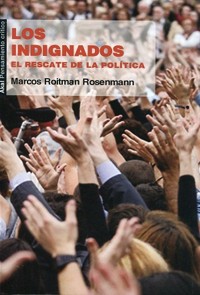The sociologist Marcos Roitman presents his book “The indignados. The rescue policy” in the University Complutense
Source: TerceraInformación. By Felix Povedano Mínguez and Rubén G. Herrera (21-04-2012)
.
 Any line of debate and analysis about a phenomenon so hugely wide as the 15M, the movement of “the indignados”, the “spanish revolution”, or as we like to call it (as in the denomination resides in the plurality) is and always will be one more way to focus on it.
Any line of debate and analysis about a phenomenon so hugely wide as the 15M, the movement of “the indignados”, the “spanish revolution”, or as we like to call it (as in the denomination resides in the plurality) is and always will be one more way to focus on it.
On the 18th of April took place one more, with enough rigor, playfulness and openness of a view. The independent editorial Akal was inaugurated in the School of Labour Relations of the Complutense University the book of the doctor of Political Sciences and Sociology researcher Marcos Roitman Rosenmann ‘s indignados: the rescue of the policy .
More than fifty people attended the event, which was attended at the table: the student of Political Science Eduardo Fort and the journalists José Manuel Martín Medem and Paula War.
An uncommon presentation where the formal elements and the linear relationships speaker-public were not to be had, in good measure because neither the phenomenon of mass unrest of our time maintaining the traditional communications links, in favor of a true dialogue.
The participants, who agreed that the book is a great tool for understanding the phenomenon of the 15-M in Spain, broke down briefly his reflections on the work of Roitman and then let the author perform an analysis more widespread.
Thus, the sociologist pointed out that the indignados what they do is claim “that the politics of the everyday has ceased to do”. In his opinion, “the policy has been ceding space to the economic power and that is what has taken away from the people.” Another issue that Roitman was concerned is the role of the media. “There is an attempt to make a show with the indignados, where mix of chilean students, the 15-M and the arab spring All are outraged!”, quipped. So “closing linguistically colonization ideological at the global level”.
The citizens have been transformed into consumers because “the political” has given way to “economic”. We are facing a totalitarianism that is the inverse, which is the system that is imposed and conditioned to a dynamics: the market. Capitalism feels threatened and that is why this militarized society, and conceiving the citizen as the enemy, an amorphous enemy, and that this in all parties.
For this reason, the policy has ceased to be the center in the public opinion, and the 15M assumes a “rescue”, but not a recovery.
The journalist Martín Medem questioned two statements present in the new work Rotiman: the 15-M has transformed the political reality of the country and its proposals to be shared by the majority of the population. According to the journalist, this transformation has not been such, while the support on the part of citizens has more to do with an “emotional sympathy” and not so much with a defense conscious. For its part, the also journalist Paula War he disagreed with Rotiman in the affirmation that “capitalism feels more threatened than ever.” The author, however, justifies the relevance of this reflection: “The capitalism is strong in its sphere of action, but feels threatened”. According to the sociologist, the reform of the penal code announced by the Government of the PP after the last strike call is a proof of it.
Another criticism of Medem was directed this time not at the author, but at the own 15-M. In his opinion, the movement has shown a “lack of humility” on several occasions, in addition to an interest to be void due to the “democratization of the media”. In this sense, Medem put as an example to Latin America, where “there is already the access of social movements to the media”. Also, reported as necessary to the development of an alliance between the trade unions and left-wing parties, on the one hand, and the social movements, on the other. “Now is not the time to be anti-capitalist, antineoliberales or claim a socialist process, but simply to defend the democracy”, he concluded.
After the interventions from the table, opened a tuno of word for the attendants, who also provided their reflections and continued some of the discussions already initiated during the presentations.
One of the people who intervened from the audience was the professor of Political Science at UNED and member of the Left, anti-Capitalist Jaime Pastor, who stated that the 15-M has managed to “introduce topics on the public agenda”, such as, for example, “evictions”; while, from other sectors of the public are reminded that this matter and others already for a long time were claimed by different social movements, but without the media exposure enjoyed by the 15-M.
Most striking was the reply of a responsible for the 15M in Madrid, Liliana Pineda, on one of the main conclusions of the author, who says: “if one wants to change something, you have to be part of the institutions”. Liliana criticized this vision of institutionalization of social participation by pointing out that in the 15M movement have been forms of social organization that they work better than the majority of the organizations (Ngos, social movements, etc); what happens, is that these forms of organization are not conventional, but effective.
.
